- Home
- Herman Melville
Moby-Dick (Barnes & Noble Classics Series) Page 3
Moby-Dick (Barnes & Noble Classics Series) Read online
Page 3
Melville left school in his teens, but he was immensely intelligent, with curiosity to match, and he continued his education by having the run of libraries and through conversations with his friends. There can be an advantage in the self-education of a very intelligent person—originality is less likely to be rounded off and even dulled by the cultural consensus found in the schools. A number of our writers have had to educate themselves in large part—among others Walt Whitman, Emily Dickinson, Mark Twain, Ernest Hemingway, and William Faulkner. The poet W. H. Auden remarked that a number of classic American authors wrote as though no one had done so before them, and while the comment has the panache of exaggeration, it points to a quirky freshness that has something to do with modest institutional training, a circumstance now rare when extended education is so common.
The largest body of material outside the plot, though intimately related to it, is the information about whales and whaling. In providing this, Melville of course relied on his own experience, but he also consulted the works of others who had written about the industry, and a good deal of this secondary reading found its way into the novel, usually without attribution. This was not plagiarism, of course; sources were bent to his own purposes, transformed into things the narrator now and then reports that he learned from others but more often presents as coming from his own long-standing knowledge. He is also occasionally given to satire about solemn erudition: The long riff in chapter XXXII, “Cetology,” about “Folio,” “Octavo,” and “Duodecimo” whales is a send-up of scientific classification systems as well as an explanation of real differences.
The book is organized as a recurring wave-like pattern of calm and tension. From the start a rhythm is established in which information about the scene or about the whaling alternates with something about the looming purpose of Ahab’s quest. The “Etymology” and “Extracts” preceding the narrative are both amusing and serious: On the one hand they are extravagant and arbitrary, and on the other they show humanity’s awe at the colossal scale of the whale’s presence.
The third Extract quotes the Bible about Jonah, who will be the central figure in “The Sermon” by Father Mapple (chap. IX). Jonah is also mentioned in the thirtieth Extract, which reports in a matter-of-fact way that a harpooner caught a whale “that was white all over” (p. 15). Melville begins to complicate that creature at the end of “Loomings” (chap. I), where Ishmael, in the “wonder-world” of his experience and in his “wild conceits,” sees a procession of whales “two and two,” evoking thoughts of both fertility and the destruction of the Flood. At the chapter’s end there is the vision of the “grand hooded phantom” in language that combines magnificence and foreboding.
The information about whaling and whales is interesting in itself, but also vital to the fiction because it anchors in reality things that would otherwise look even more strange than they do. If one thinks of the bare-bones plot, there are things hard to believe. Despite Ahab’s force of character, it seems unlikely that he could retain the crew’s loyalty, deranged as he is. Except for him and his mysterious boat crew, everyone on board has signed on for the money to be made, about which Ahab cares nothing. But as with Ahab, Melville’s quarry is much larger than life: Every allusion to Moby Dick heightens the whale’s status to that of a nature-god, who does not so much swim in water as in myth. Seen this way, the novel concerns a crazy man who tries to kill a legend.
Melville lends credence to these improbabilities by embedding them in a world of detail. The central part of the novel is in large measure given over to the technical aspects of whaling—the equipment, the anatomy of the whales, the procedures of the hunt. Chapters LV to LVII show how whales have been portrayed, and from there to chapter CV we are told most of what we need to know. During this section we are only intermittently brought back to the movement of the plot for which the book’s first third sets the scene, and which, in the final chapters, drives toward the disaster. And just as the unlikely is given reality by what is on this ship the mundane, so in turn the frequently heightened language in which the ordinary is portrayed casts a glow that often makes common life seem astonishing. The novel’s action takes place in a realm that is not quite ours but that is not entirely alien.
One of the major sources of the book’s vitality is this vividness about the ordinary. Melville brings everything to life—not only the human characters and the creatures of the sea, but also the sea itself and the Pequod upon it. Such passages operate on us like animism, giving life and energy to inanimate things such that the whole world is charged with intention though we do not know to what end.
The Pequod has barely weighed anchor in Nantucket when the analogies turn it first into a warrior and then into the largest of land animals: “We found ourselves almost broad upon the wintry ocean, whose freezing spray cased us in ice, as in polished armor. The long rows of teeth on the bulwarks glistened in the moonlight; and like the white ivory tusks of some huge elephant, vast curving icicles depended from the bows” (p. 137). A little later “with a fair wind the ship was rushing through the water with a vindictive sort of leaping and melancholy rapidity” (p. 158).
In thinking that color may not be inherent in visible objects, the narrator humanizes the macrocosm only to make it ill: “The palsied universe lies before us a leper” (p. 238), and in a bravura passage as the ship approaches the Cape of Good Hope,the Cape winds began howling around us, and we rose and fell upon the long, troubled seas that are there; when the ivory-tusked Pequod sharply bowed to the blast, and gored the dark waves in her madness, till, like showers of silver chips, the foam-flakes flew over her bulwarks; then all this desolate vacuity of life went away, but gave place to sights more dismal than before.
Close to our bows, strange forms in the water darted hither and thither before us; while thick in our rear flew the inscrutable sea-ravens. And every morning, perched on our stays, rows of these birds were seen; and spite of our hootings, for a long time clung obstinately to the hemp, as though they deemed our ship some drifting, uninhabited craft; a thing appointed to desolation, and therefore fit roosting-place for their homeless selves. And heaved and heaved, still unrestingly heaved the black sea, as if its vast tides were a conscience; and the great mundane soul were in anguish and remorse for the long sin and suffering it had bred . . .
. . . we found ourselves launched into this tormented sea, where guilty beings transformed into those fowls and these fish, seemed condemned to swim on everlastingly without any haven in store, or beat that black air without any horizon (p. 280).
Here moral consciousness is given to all the ocean’s animals, if only to make them suffer, and the somber intensity of the language calls us back to the purpose of Ahab’s voyage, which is both noble and insane.
That in the passage’s final image neither ocean nor air offers safe haven points to a large difference of view about nature’s role among our nineteenth-century writers. Attitudes toward nature are often related to religious beliefs, and for Ralph Waldo Emerson, as usually for Henry Thoreau, nature is our secure home and the source of inspiration if our imaginations are open to it. Religious reformers and social commentators, both were New Englanders who had grown up in a landscape humanized by two centuries of settlement. They were concerned to make human life worthy of its natural surroundings, and these were in turn seen as informed by spiritual truth.
Writers of fiction were less confident about our home in nature. In the dark stories of Edgar Allan Poe, the physical world can give way at any moment, and in the work of Nathaniel Hawthorne, nature is benevolent or malign as a function of the psychology of the characters. For Melville, as later for Mark Twain, nature may be the mother of us all, but her violence destroys life as readily as she creates it; vigilance is the cost of survival, and even then we take great risks. Talking to Starbuck, Ahab describes the face of nature as a pasteboard mask: He varies between a belief that “some . . . reasoning thing” lies beneath it, and the thought that there may be nothing there at all
(p. 203). While one must not confuse an author with his characters, Ahab is raising religious and philosophical issues that concerned Melville as well.
Ishmael
It is clear that Melville is not Ahab, nor is he Ishmael, though here the relationship is more complicated. “Call me Ishmael,” chapter I begins: The borrowed name lets us know that he will tell us only what he wants to, and that he is a man apart from his fellows. The biblical Ishmael is the illegitimate son of Abraham by Rebecca’s servant Hagar, and even though the Lord is good to Ishmael later in Genesis, his half-brother, Isaac, inherits the Lord’s covenant through their father (Genesis 16, 17, 21, and 25).
Melville’s narrator promptly describes dark thoughts approaching self-destruction: He pauses before coffin warehouses and follows every funeral he meets. But in the novel things don’t remain so grim for long. Just as the Lord in Genesis is good to Ishmael despite his illegitimacy, so Melville’s Ishmael floats to rescue with his best friend’s burial box. The image of death has become the means to life, a change typical of Melville’s density of view and sense of ambiguity. And the narrator’s depressions spoken of at the beginning are modulated by the very language in which they are described: He is serious in describing his “spleen” and the “drizzly November” in his soul, but he presents them in a way that masks the pain even as it bodies it forth. The joking tone in which that account is developed is one we hear very often from the narrator even when he speaks of serious things.
The Ishmael we hear at the beginning is in some ways the book’s most illusive character because, just as the biblical name suggests an outsider, a wanderer of sorts, he wanders in and out of the novel’s narrative voice as it moves along. In the early chapters he is fully present as a character as he leads us toward the Pequod, but once on board he soon melds into the crew as his storytelling duties are taken over by the much more knowledgeable narrator whose arrival is not announced, but whose presence is clear as early as chapter XXIX when we overhear an exchange between Ahab and Stubb, the second mate.
They are on the quarterdeck, where Ishmael, as a common seaman, has no right to be unless working, and even if he were he could not overhear Stubb’s private thoughts as he descends into the cabin. There is much in the book that Ishmael the crew member could not see or overhear: conversations between the ship’s officers, Ahab’s behavior at dinner with his officers, to say nothing of Ahab’s private thoughts in a dramatic monologue complete with stage directions. In “Sunset” (chap. XXXVII), the scene is “The cabin; by the stern windows; Ahab sitting alone, and gazing out” (p. 207). As in the preceding chapter, “The Quarter Deck” (chap. XXXVI), we have suddenly changed literary genres—we are for a short time in a play, not a novel.
As the action requires of him, Ishmael now and then returns as a man with a particular role on the ship, someone who could not have the wider knowledge we are often given. In chapter LXXII he is at one end of a rope with Queequeg at the other; in chapter XCIV he is squeezing coagulated oil back into liquid; in chapter XCVI he almost capsizes the ship; in the Epilogue he is floating with Queequeg’s coffin so that the ship Rachel can bring him back to tell the story.
These are inconsistencies, but how bothersome are they? Most readers have not been much troubled. Both narrators have the same voice and personality—one simply becomes the other, and it is best to think of them as the Ishmael who acts and the Ishmael who narrates, two functions of the same identity. Often enough we may not even notice the change from one to the other because we are caught up in the action and the strange brilliance of the style.
The book’s general narrator occupies a position between Ishmael, on the one hand, and Melville, on the other. We don’t confuse Melville with the other two—that shared personality is the author’s construction to serve his ends. But it is true that Moby-Dick is an opinionated work, and it is not surprising that the narrator sometimes expresses views that we assume to be Melville’s. This is true, for example, in “The Ship” (chap. XVI), where Melville seems to wonder what it will take to turn an old American sea captain into a noble figure worthy of the greatest classical tragedies. The paragraph is a virtual recipe for what Melville will do in creating Ahab later in the book, so much so that he might have written it after he had largely finished with Ahab, and placed it early in the book as a sign of what is to come (p. 106).
There are also passages in which the narrator expresses directly to the reader opinions that are appropriate to the text and are views that Melville clearly held. After explaining how property rights are established after a dead whale is temporarily abandoned, he asks, “What to the ostentatious smuggling verbalists are the thoughts of thinkers but Loose-Fish? What is the great globe itself but a Loose-Fish! And what are you, reader, but a Loose-Fish and a Fast-Fish, too?” (p. 463). We should be annoyed if we thought that the story line were there only to set us up for the generalization, but Melville’s gifts as a storyteller prevent this: The comment rises from the action. While the passage is not about Ahab, it implies what is wrong with him—in his arrogance and isolation he denies the inevitable interdependence of personal identity and community, one of the novel’s great themes.
In a novel where ambition reaches out to some of the largest matters—man’s position in the natural world, the nature of charismatic rule in its moral dimensions, the very nature of reality itself—there are notable exclusions in Moby-Dick, though not through oversight. Important aspects of daily life are less represented than one would usually expect in a novel: Food, sleep, hygiene, pastimes are hardly present, nor matters of health—important on such a vessel—except for Queequeg’s illness.
These exclusions come about because the literary genre closest to Moby-Dick is not the traditional prose narrative, but the epic—a form in which the texture of common life is often treated lightly to allow concentration on the protagonist and heroic action. After the nights and steaks in New Bedford’s Spouter Inn and the meals of Mrs. Hussey’s Nantucket chowder, there is little detail of this kind once the Pequod leaves the dock, with four-fifths of the novel still to come.
Sexuality is powerfully present, but is more directly addressed in the ocean’s creatures than among the men who hunt them. There is the wonderful vision in “The Grand Armada” where the sailors see birth and nursing among a school of sperm whales. “Some of the subtlest secrets of the seas seem divulged to us in this enchanted pond. We saw young Leviathan amours in the deep” (p. 451). But with the unsentimental realism so typical of Melville, this monumental ocean-pastoral is checked by the very hunt that allows the men to see it: The whalers are in the business of killing as many of these creatures as possible, and the cetacean mothers-milk will be red with blood.
Among the men these sexual issues are more guarded. It is of course a world without women; marriage and children are mentioned but never brought to life. Ahab has left his wife and child behind as almost all men did, but he has also done so emotionally, and while Peleg tells Ishmael that “Ahab has his humanities!” (p. 113) it is not a good sign that this needs to be said. Ahab’s initial isolation in his cabin is attributed to a serious wound in the groin inflicted by his whalebone leg, a sexual injury suggestive of what he has done to his own humanity. Less grimly, Queequeg compares the symbolism of Ahab’s gold doubloon, nailed to the mast, to “something in the vicinity of his thigh,” and Ishmael remarks, “I guess it’s Sagittarius, or the Archer” (p. 503). These are coded references to energies that are more happily opened up at the Spouter Inn, where Ishmael and Queequeg become friends.
These two bear the book’s principal weight of affection, the love that best binds mankind together. In a later chapter they are on the two ends of a “monkey-rope,” Ishmael protecting his friend who is on the carcass of a whale with sharks attacking from below (chap. LXXII), and at the end of the book it is with Queequeg’s coffin that Ishmael saves himself. There are other characters who briefly show gentle and even affectionate recognition: Both Starbuck and Pip reach out to Ahab
, who must rein in his momentary sympathies if he is not to be swayed from his purpose.
The matrimonial imagery of the Spouter Inn scenes is explicit, as Queequeg the first night holds Ishmael in “his bridegroom clasp,” but Ishmael finds this “a comic predicament” that he wishes to escape. The two become fast friends, and after talking in bed, “in our hearts’ honeymoon, lay I and Queequeg—a cosy loving pair” (p. 82). Queequeg tells the story of his life, and then “embraced me, pressed his forehead against mine, and blowing out the light, we rolled over from each other, this way and that, and very soon were sleeping” (p. 87). There has been controversy about this imagery, some seeing a movement toward romantic love. But one must be very careful before pushing Melville’s language into special meanings. More often than not such narrow readings do violence to Melville’s imaginative world, reducing rather than illuminating the resonance of the text. While it is true that the only fully happy ship the Pequod meets is called The Bachelor, one remembers that the permanent party on that ship’s deck includes the native girls who have run off with the sailors.
Ahab
While Ishmael and Queequeg are the repositories of fellow-feeling, Ahab has almost entirely killed that in himself, and on the few brief occasions when his cold resolve is softened by those “humanities” that Peleg had mentioned to Ishmael, he pushes that emotion away lest it keep him from his aim. Melville intended to make Ahab a great man, and gave him just enough sanity to make us realize how great its loss had been.
Shakespeare was an inspiration to Melville in various ways, and surely so in imagining Ahab as a tragic figure in the classic sense—a great man brought down by his faults. In one sense Melville faced a task more difficult than for the Renaissance dramatists, for whom the status of a king or queen brought with it the culture’s deference toward that still powerful office, a position at the head of humanity with overtones of divine empowerment. If the protagonist was not a king, he was likely to be in line for it, the prince of possibility. Melville was acutely aware that modernity and democracy denied him that initial advantage, and it was only the beginning of an answer to make Ahab a sea captain, the ruler of his small world, which gave him station but not nobility.

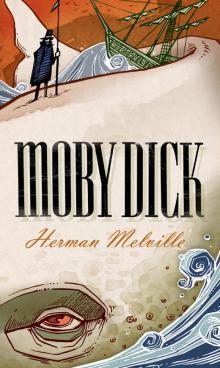 Moby Dick; Or, The Whale
Moby Dick; Or, The Whale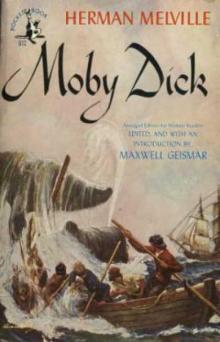 Moby Dick
Moby Dick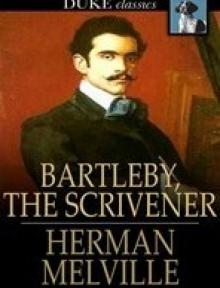 Benito Cereno and Bartleby the Scrivener
Benito Cereno and Bartleby the Scrivener Israel Potter: His Fifty Years of Exile (Annotated Edition)
Israel Potter: His Fifty Years of Exile (Annotated Edition)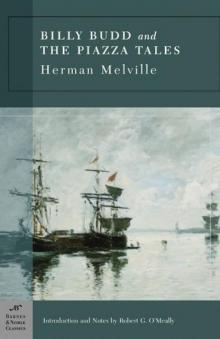 Billy Budd and the Piazza Tales
Billy Budd and the Piazza Tales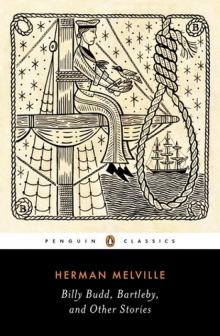 Billy Budd, Bartleby, and Other Stories
Billy Budd, Bartleby, and Other Stories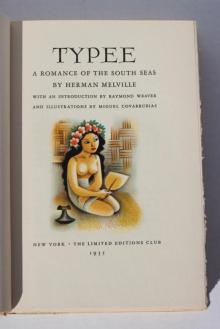 Typee: A Romance of the South Seas
Typee: A Romance of the South Seas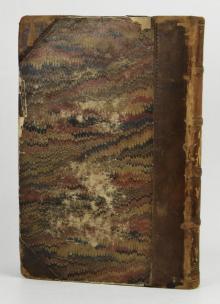 Omoo: Adventures in the South Seas
Omoo: Adventures in the South Seas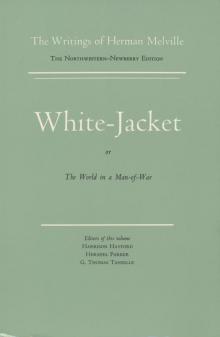 White Jacket; Or, The World on a Man-of-War
White Jacket; Or, The World on a Man-of-War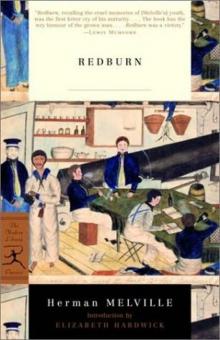 Redburn. His First Voyage
Redburn. His First Voyage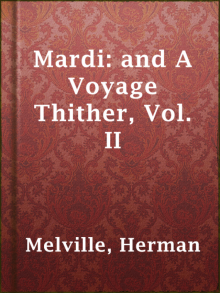 Mardi: and A Voyage Thither, Vol. II
Mardi: and A Voyage Thither, Vol. II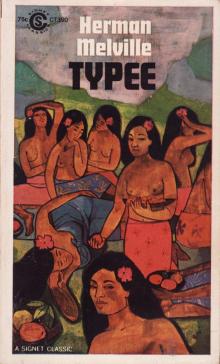 Typee
Typee The Paradise of Bachelors and the Tartarus of Maids
The Paradise of Bachelors and the Tartarus of Maids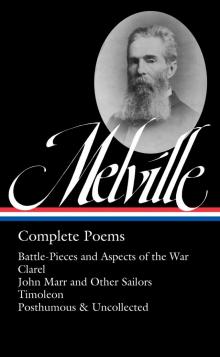 Herman Melville- Complete Poems
Herman Melville- Complete Poems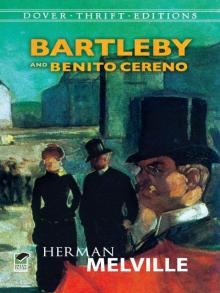 Bartleby and Benito Cereno
Bartleby and Benito Cereno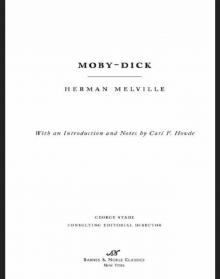 Moby-Dick (Barnes & Noble Classics Series)
Moby-Dick (Barnes & Noble Classics Series)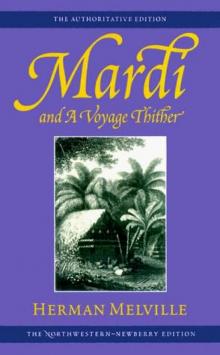 Mardi and a Voyage Thither
Mardi and a Voyage Thither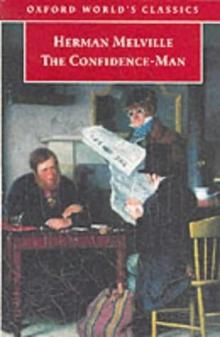 The Confidence-Man
The Confidence-Man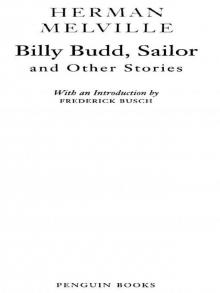 Billy Budd and Other Stories
Billy Budd and Other Stories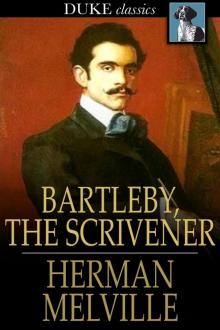 Bartleby the Scrivener
Bartleby the Scrivener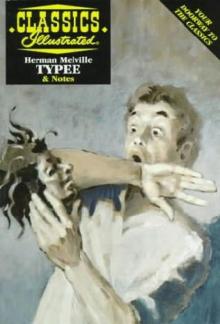 Typee: A Romance of the South Sea
Typee: A Romance of the South Sea I and My Chimney
I and My Chimney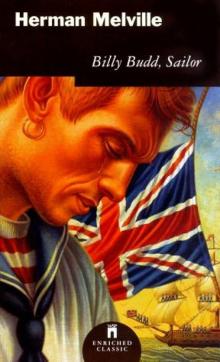 Billy Budd
Billy Budd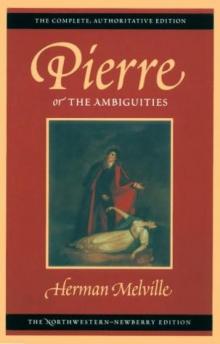 Pierre, Or the Ambiguities
Pierre, Or the Ambiguities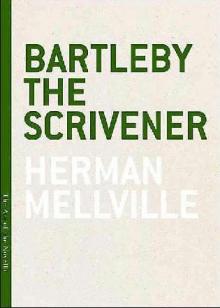 Bartleby, The Scrivener A Story of Wall-Street
Bartleby, The Scrivener A Story of Wall-Street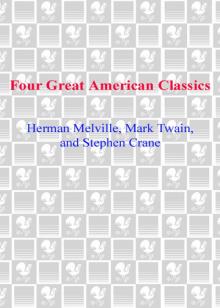 Four Great American Classics
Four Great American Classics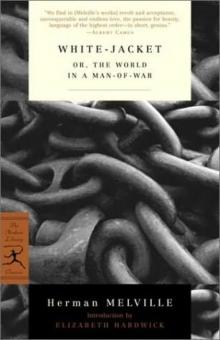 White Jacket or, The World on a Man-of-War
White Jacket or, The World on a Man-of-War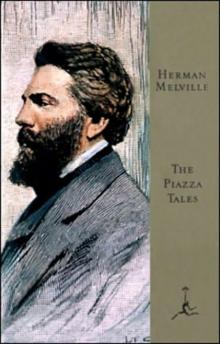 The Piazza Tales
The Piazza Tales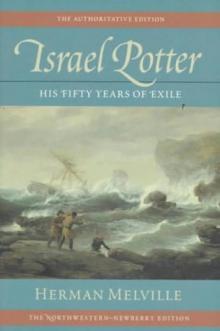 Israel Potter. Fifty Years of Exile
Israel Potter. Fifty Years of Exile